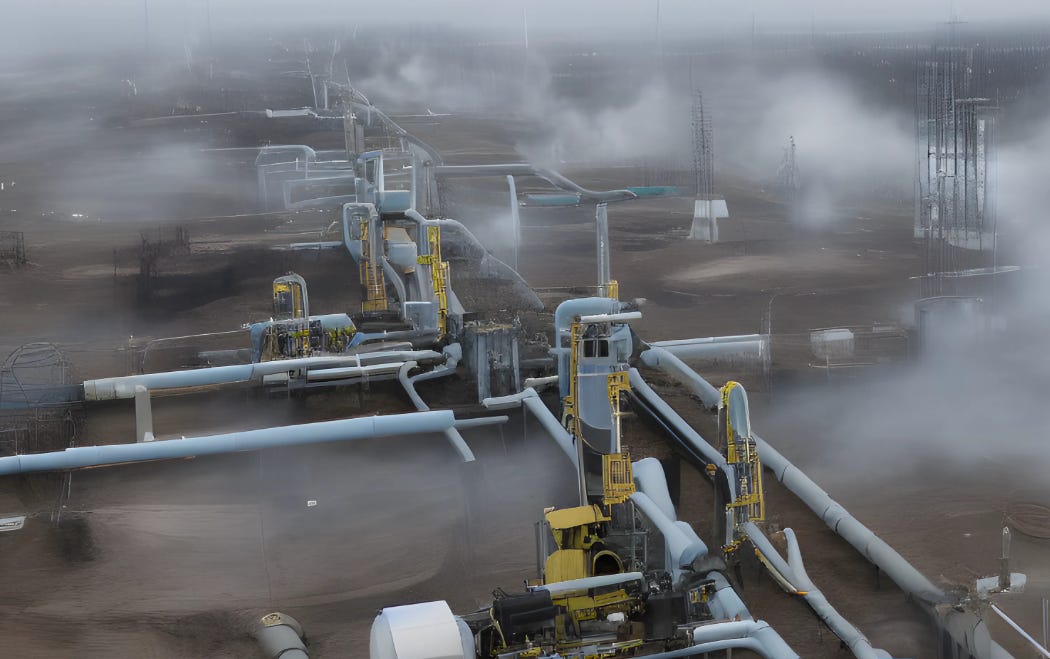The only published footage of the damage to the Nord Stream pipelines, featured on my Nord Stream Conspiracy Thread, turns out to come from Expressen, a Swedish newspaper. Their reporters hired undersea drone operators and took a boat out to the site of the explosions off the island of Bornholm. There, they found a sizeable crater and 50 metres of missing pipeline. That this is how the images should have made their way to us, rather than through any official path, speaks volumes about the eagerness of Swedish authorities to suppress this story.
Protests against the insane energy policy of the German government are gathering momentum, particularly in the East; sporadic reports are even appearing in major media outlets now. This is surely one reason that the Minister President of Saxony, Michael Kretschmer, continues to stray from official CDU talking points, calling for negotiated peace in Ukraine and likening EU sanctions to a “tsunami” threatening the German economy.
Feared gas shortages are causing chaos as customers rush to change suppliers in search of better prices, or because their current contracts have been cancelled. Several municipal utilities have flatly stopped accepting new customers, but this option is not available to the so-called Grundversorger or “basic suppliers”—the utilities that supply the majority of gas in their region. These are legally bound to take all comers, and many of them are already having difficulty meeting sudden surges in demand.
Their day-to-day solvency may also soon be a problem:
[I]t is not only the procurement prices that have risen sharply, but also the interim financing costs—that is, the sum with which the municipal utilities must bridge the time from the purchase of gas to the onward sale to the customer, and to the increase in customers’ instalment payments, [an Association of Municipal Enterprises] spokesman explained. “Both together increase the liquidity needs of the municipal utilities, and this in turn affects their ability to supply customers with electricity and gas.”
Who knows how all this will play out, and what effect (if any) proposed price limits on electricity and gas will have on the markets, but I have a crazy vision of a near-future dystopia, where a minority of wealthy customers who have maintained wildly expensive contracts with alternate providers can still heat their homes, while everyone else deals with constant outages and ad-hoc rationing schemes.
Zelensky’s economic advisor has announced that he expects the Federal Republic to contribute 500 million dollars every month to Ukraine’s defence. That sounds like a lot, but we must remember that Germany’s antigen testing program, at its height, cost around a billion Euros a month. The government has been pissing away money on crazy things for a long time now.
A survey of German companies, the majority of them small businesses, shows that 25% (up from 14% four months ago) are considering whether to lay off employees, and that 90% are planning to raise prices further than they already have. Almost six in ten are delaying planned investments.
“We have been seeing a creeping shift in industrial production for some time now,” says Rainer Kirchdörfer, Chairman of the Family Business Foundation [which conducted the survey]. “We will only recognise the deindustrialisation and loss of prosperity years from now, and by then it will be irreversible.”
The economic chaos has hit the chemical industry especially hard, and among the early shortages are iron and aluminium salts, crucial precipitating agents used in wastewater treatment. Four federal states have already relaxed their rules on water purification. Chemicals necessary for the treatment of drinking water are also increasingly scarce.
Can’t we just increase our production of biogas to end our dependence on Russia and save the climate at the same time, ask the drooling knuckle-dragging morons at Westdeutscher Rundfunk?
Overall, the share of biomethane in the German gas market could triple, according to a study by the German Biomass Research Centre in Leipzig. The Capital Bioenergy Office says in a statement that biogas plants could offset about 4 percent of Russian natural gas imports in the short term. It also says it is possible for biogas to provide 46% of the electricity from gas-fired power plants.
So, if we put all of our grain into power production, we have the prospect not only of freezing to death, but of starving to death too. I’m glad state media are investigating this promising angle.
Finally, Business Insider has discovered that the real victims of the gas crisis won’t be young children in fragile health or elderly pensioners on fixed incomes, but female professionals. Ordinances requiring offices to set thermostats at 19C, according to some garbage study, will cognitively disadvantage women, while (even worse) advantaging men, who bizarrely are alleged to perform their best at this precise temperature. Happily, though, Tagesschau has consulted Dr. Georg Ertl from the University Hospital at Würzburg, who believes this unfortunate sexism, brought upon us by the furtherance of liberal democracy, can be countered by … caps and stockings.
As long as there are developments, this will be a semi-regular series. Find Part 1 here, Part 2 here, Part 3 here, Part 4 here, Part 5 here and Part 6 here.





In this most deadly serious of times, we a led by deeply unserious people.
Don't worry, it's all fine. I see Marks & Spencer have changed the spelling of 'Kiev' on their Chicken Kiev packaging so once Putin sees what he's up against he is bound to fold.